The Jewish 8-day holiday of Hanukkah (Hebrew for “Dedication”) began last Sunday evening. Two thousand years ago, it was a major Jewish festival of miracles that inspired Jews and early Christians alike. Later, Jewish religious leaders suppressed and ignored both the holiday and the story behind it. Meanwhile, early Christians were inspired by it. It was early Christians who preserved the Hanukkah story by including it in their Bible.
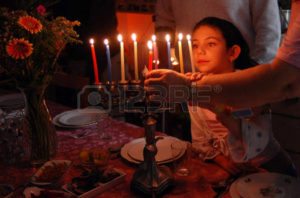
When I was a kid in New Jersey in the 1950’s, the holiday was usually spelled Chanukah with the “ch” pronounced “kh”. I was taught in my Hebrew school that it was a minor holiday for most Jews. My rabbi even criticized American Jews who made a big deal out of Hanukkah. He said they were doing it only to imitate Christians who celebrated Christmas during the same time of year.
Hanukkah is not mentioned anywhere in the Jewish Old Testament. It is barely mentioned in the Jewish Mishna and Talmud, the two other sets of books that define and describe modern Judaism.
However, the complete story of Hanukkah is found in the Apocrypha section of Roman Catholic and Greek Orthodox Christian Bibles. The English word “macabre” probably comes from plays that told the Hanukkah story in Catholic churches during the Middle Ages. The Gospel of John describes how Jesus preached in Holy Temple in Jerusalem during the Feast of Dedication (the English translation of Hanukkah). After his life was threatened, Jesus only seemed to visit the capital of Jerusalem (with its Roman soldiers and wealthy and powerful elites) during major holidays. That was the only time he was surrounded and protected by large crowds of common people from farms and small towns in his native Galilee.
Hanukkah is not like the Jewish holidays of Passover or Sabbath. There are no special synagogue services. It is a regular day of work and school. Jews light candles at home and praise God for “making miracles for our ancestors during this season“.
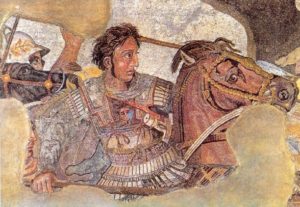
What were those miracles? The Jewish Talmud describes only one. When the Greeks were driven out of the Jewish Temple, there was only enough pure olive oil to keep the seven branch menorah lit for one day. However, that one day supply of oil miraculously burned for eight days, until new oil could be pressed.
The Books of the Maccabees in Roman Catholic and Greek Orthodox Bibles tell a far more detailed and dramatic story. It begins when Alexander the Great died after conquering most of the known world. Alexander divided his vast empire among his three top commanders, his friends since boyhood. One ruled Macedonia in Europe, another ruled Egypt, and a third ruled all the provinces in Asia from what is now Turkey to India.
About 150 years later, Antiochus, the Greek ruler of what is now Israel and the other Asian provinces tried to take control of the European and Egyptian portions of the empire as well. His name was Antiochus.
Antiochus declared that there should be one Greek empire with one ruler, one culture, and one religion. He ordered every nation under his control to publicly worship Zeus and the other Greek gods. Everyone complied except the Jews. Although they paid taxes and obeyed all other laws, Jews stubbornly clung to their Bibles. They refused to work or compete in athletics on Sabbath, refused to eat pork, and refused to offer sacrifices to the Greek gods. They also continued to circumcise their sons.
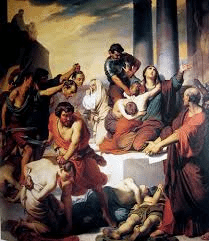
The Greek emperor Antiochus then ruled that the Jewish religion was subversive, and had to be eliminated. Antiochus and his administrators declared that any Jew found with a Bible in possession was to be tortured and killed. So was any Jew who circumcised his or her sons, refused to work or compete in games on the Sabbath, eat pork, or sacrifice to Greek gods.
Eleazer was an elderly philosopher who was respected in the Greek community. When he refused to publicly eat pork, he was arrested, and beaten. He was given the chance to save his life by just publicly eating permitted meat while pretending it was pork. When he refused, his skin was stripped off with sharp instruments, and he was burned alive.
A random woman named Hannah was arrested, along with her seven sons were arrested. One by one her sons were ordered to publicly eat pork. One by one, each of them refused. One by one, their tongues were cut out, then their arms and legs were cut off. Finally they were thrown into pans of boiling oil. After all seven of her sons were tortured and killed in this way, Hannah was tortured and killed in the same way.
If any infant boy was found to be circumcised, the baby and mother were killed, and the bodies were publicly displayed with the body of the dead baby tied to his mother’s neck.
Slowly, Israel’s leading citizens began to comply. It seemed as if the Jewish religion was doomed. But then one day, a priest named Mattityahu (Gift of Jehovah) also spelled Matthew or Mattathias escaped from the Temple in Jerusalem and fled to the small town of Modin. Later they hid in caves in the desert. They learned, taught, and practiced military skills and tactics. They learned how to make swords, spears, shields, armor, and other seapons of war. Then they fought back against the Greeks. They attracted thousands of followers, and soon became known as “The Hammers” (“Maccabees” in Hebrew).
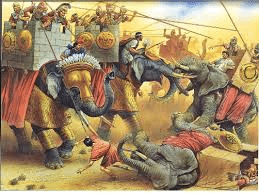
The Maccabees offended many traditional Jews. The Maccabees surprised the Greeks by fighting disregard the Bible law against working and fighting on the holy Sabbath. (They justified this by saying God had commanded Jews to live by these laws, and not die because of them.)
The Maccabees also sent ambassadors to Italy and negotiated a military alliance with the non-Jewish Roman Republic. This forced turned the Jewish rebellion into a world war, and forced the Greeks to divide their forces.
After years of struggle, the Maccabees won, and drove the Greeks out of Jerusalem. Most Jews celebrated the survival of the Jewish religion as the miracle of Hanukkah.
The Maccabees then became kings of an independent Jewish kingdom. This also offended Jews who believed only a descendant of King David from the tribe of Judah could be king. The Maccabees were from the priestly tribe of Levi. For centuries, Jewish tradition did not permit priests to be political leaders.
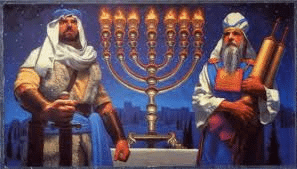
One hundred years later, two spoiled great-grandsons of the Maccabees ruined the miracle. While fighting with each other over who should be king, one invited Pompeii, the commander of a nearby Roman army for help. Pompeii marched into Jerusalem and instead made Israel another conquered Roman province.
Later, Jews inspired by the Hanukkah story rebelled against Rome three times. During these rebellions, time, there were no miracles. The Romans destroyed the Jewish Temple and all Jerusalem. They sold hundreds of thousands of Jewish men, women, and children as slaves throughout the Roman Empire. The Romans even gave the ruined Jewish province a new name — “Palestine”. Israel was now named after the Philistines — their ancient enemies of Jews During this time, the Maccabee books telling the story of Hanukkah disappeared from the Jewish Bible.??
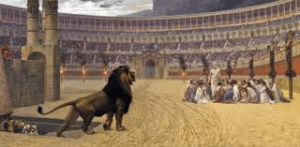
Ironically, early Christians were inspired by the Hanukkah story that so many Jews wanted to forget. During the year 64, the Roman Emperor Nero declared Christianity to be a subversive religion. He tried to wipe out Christianity just as the Greeks previously tried to wipe out Judaism. For the next 300 years, Roman soldiers arrested, tortured, and killed Christians throughout the Empire who refused to renounce their faith. Some were covered with tar and burned alive as human torches. Others were fed to hungry lions in stadiums to entertain cheering crowds.
Those early Christians kept their hope alive by remembering how God redeemed the Jews from the Greeks hundreds of years earlier. They kept Books of the Maccabees in their Bibles.
The Jewish holiday of Hanukkah is celebrated on a different day each year in the Western Calendar. However, it always celebrated on the 25th day of the month of Kislev, the first winter month in the Hebrew calendar. Each month of the Hebrew calendar starts with the new moon and has 29 or 30 days. To catch up with a calendar based on the yearly cycle of the sun, a 13th month is added to the Hebrew calendar every few years. That is why Jewish holidays determined by the Hebrew calendar based on the moon’s monthly cycle fall on different days each year on our Roman calendar based on the sun’s yearly cycle. The New Testament does not specify the day Jesus was born. However, roughly 300 years later, Christians began celebrating the birth of Jesus on the 25th day of the first winter month of the Roman calendar. Coincidence?
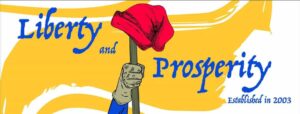
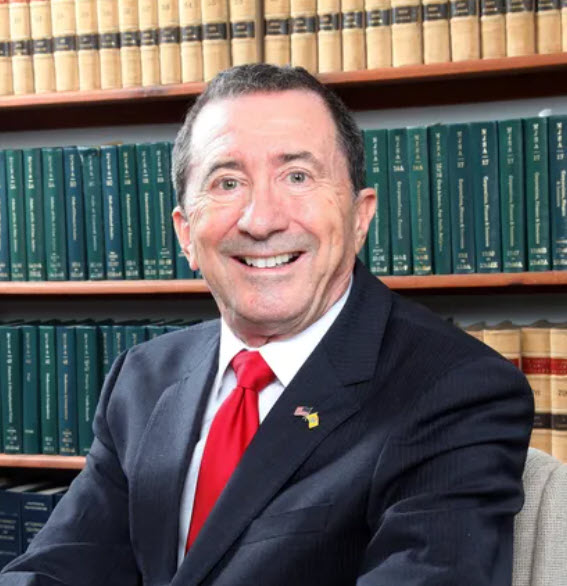
I’m always enlightened by the wealth of knowledge that Seth possesses, and explains in such a way that is interesting and easy to understand.